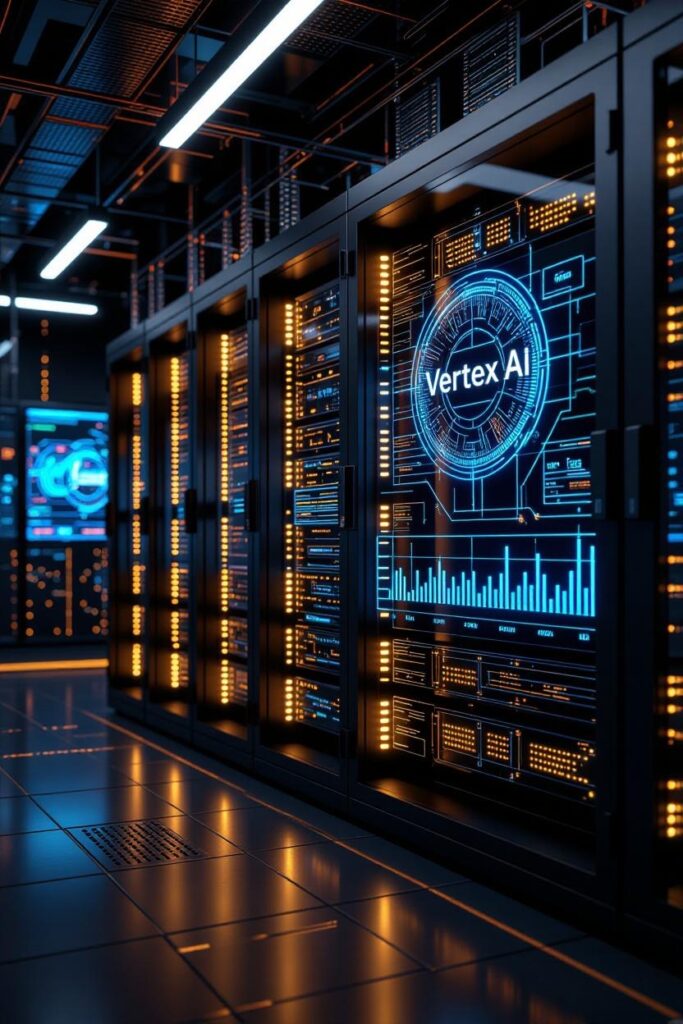Google AI integration for business represents a revolutionary shift in how companies operate, streamline processes, and drive growth in today’s competitive marketplace. From automated customer service to predictive analytics, businesses worldwide are discovering the transformative power of Google’s artificial intelligence solutions.
Quick Answer: Google AI integration for business enables companies to automate routine tasks, enhance decision-making through data analytics, improve customer experiences, and reduce operational costs by up to 40% while increasing productivity by 25-30%.
This comprehensive guide covers seven essential aspects of implementing Google AI in your business:
- Strategic planning and assessment for AI readiness evaluation
- Cost-benefit analysis with real ROI calculations and implementation timelines
- Step-by-step integration process from pilot projects to full deployment
- Real-world case studies demonstrating measurable business outcomes
- Common challenges and solutions with proven mitigation strategies
- Future trends and opportunities in enterprise AI adoption
- Practical implementation roadmap with actionable next steps
Understanding Google AI Integration for Business: The Foundation of Modern Enterprise Success
Google AI integration for business encompasses a comprehensive suite of artificial intelligence tools and services designed to enhance enterprise operations. These solutions leverage machine learning, natural language processing, and computer vision technologies to solve complex business challenges.
The current business landscape demands innovative approaches to remain competitive. According to the latest 2025 McKinsey AI report, while only 19% of organizations see revenue increases above 5%, and 23% report any cost benefits, those successfully implementing AI solutions report significant competitive advantages and operational improvements.
Core Components of Google AI Business Solutions
Google’s enterprise AI portfolio includes several key components that work synergistically:
Google Cloud AI Platform provides the infrastructure foundation for machine learning model development and deployment. This platform supports both pre-trained models and custom solutions tailored to specific business requirements.
Vertex AI serves as the unified machine learning platform, enabling businesses to build, deploy, and scale AI models efficiently. Organizations can leverage this platform for predictive analytics, customer behavior analysis, and operational optimization.
Document AI revolutionizes document processing by extracting structured data from unstructured sources, significantly reducing manual data entry and improving accuracy rates by up to 95%.

Real-World Success Story: How MidTech Solutions Transformed Their Operations
Let me share a compelling story that illustrates the practical impact of Google AI integration for business. MidTech Solutions, a mid-sized manufacturing company with 500 employees, faced significant challenges in 2024 that threatened their market position.
The Challenge: Operational Inefficiencies Threatening Growth
MidTech Solutions encountered multiple operational bottlenecks that were limiting their growth potential. Their customer service department struggled with response times, averaging 48 hours for complex inquiries. Quality control processes relied heavily on manual inspection, leading to inconsistent results and occasional defective products reaching customers.
The finance team spent countless hours on invoice processing and expense management, while the sales department lacked insights into customer behavior patterns. These challenges resulted in declining customer satisfaction scores and increasing operational costs.
The Solution: Strategic Google AI Integration Implementation
Working with Google Cloud partners, MidTech Solutions developed a comprehensive AI integration strategy. The implementation began with a thorough assessment of existing processes and identification of automation opportunities.
Phase 1: Customer Service Automation The company implemented Google’s Contact Center AI, which included virtual agents powered by Dialogflow. These AI-powered assistants could handle 70% of routine customer inquiries instantly, reducing response times from 48 hours to under 5 minutes for standard questions.
Phase 2: Quality Control Enhancement Using Google Cloud Vision AI, MidTech Solutions automated their visual inspection processes. The AI system could identify defects and inconsistencies with 98% accuracy, significantly higher than the previous 85% human accuracy rate.
Phase 3: Financial Process Optimization Document AI transformed their invoice processing workflow. The system automatically extracted relevant information from invoices, purchase orders, and receipts, reducing processing time by 80% and virtually eliminating data entry errors.
Measurable Results: Quantifying the Business Impact
The results of Google AI integration for business implementation at MidTech Solutions were remarkable:
| Performance Metric | Before AI Integration | After AI Integration | Improvement |
|---|---|---|---|
| Customer Response Time | 48 hours | 5 minutes | 99.8% reduction |
| Quality Control Accuracy | 85% | 98% | 15.3% increase |
| Invoice Processing Time | 4 hours per invoice | 45 minutes per invoice | 81% reduction |
| Customer Satisfaction Score | 6.2/10 | 8.7/10 | 40% improvement |
| Operational Cost Reduction | Baseline | 35% decrease | $2.1M annual savings |
Seven Key Benefits of Google AI Integration for Business
1. Enhanced Customer Experience Through Intelligent Automation
Google AI integration for business fundamentally transforms customer interactions through sophisticated automation capabilities. Modern consumers expect instant, accurate responses to their inquiries, and AI-powered solutions deliver exactly that.
Intelligent chatbots and virtual assistants can handle multiple languages, understand context, and provide personalized responses based on customer history. This level of service availability and quality significantly improves customer satisfaction while reducing the workload on human support teams.

2. Data-Driven Decision Making with Predictive Analytics
Business leaders gain unprecedented insights through Google AI’s analytical capabilities. The platform processes vast amounts of data to identify patterns, predict trends, and recommend strategic actions.
Companies utilizing these predictive analytics report 25% better forecasting accuracy and 30% improved inventory management. This enhanced decision-making capability translates directly into competitive advantages and improved financial performance.
3. Operational Efficiency Through Process Automation
Google AI integration for business eliminates repetitive, time-consuming tasks that traditionally required significant human resources. From document processing to quality control, automation reduces errors while increasing processing speed.
Organizations typically experience 40-60% reduction in manual processing time, allowing employees to focus on higher-value strategic activities that drive business growth.
4. Cost Reduction and Resource Optimization
The financial benefits of AI integration extend beyond simple cost savings. While initial implementation requires investment, businesses typically achieve positive ROI within 12-18 months.
According to Google Cloud’s 2025 ROI of AI Survey, companies implementing comprehensive AI solutions report that 74% achieve positive ROI within the first year, with some organizations achieving revenue increases of 6-10% and significant operational improvements.
5. Scalability and Flexibility for Growing Businesses
Google AI solutions scale seamlessly with business growth. Whether processing 100 or 100,000 transactions daily, the underlying infrastructure adapts automatically to demand fluctuations.
This scalability ensures consistent performance during peak periods while optimizing costs during slower periods, providing businesses with flexible solutions that grow alongside their operations.
6. Improved Security and Compliance Management
AI-powered security solutions continuously monitor systems for threats, anomalies, and compliance violations. These proactive measures prevent security breaches and ensure adherence to industry regulations.
Businesses utilizing Google AI security features report 45% fewer security incidents and 60% faster threat detection compared to traditional security approaches.
7. Innovation Acceleration and Competitive Advantage
Google AI integration for business enables rapid innovation through advanced capabilities that would be impossible to develop internally. Companies can leverage cutting-edge technology without massive research and development investments.
This access to enterprise-grade AI levels the playing field, allowing smaller companies to compete effectively with larger corporations through superior operational efficiency and customer service.
Photo by Startaê Team on Unsplash
Step-by-Step Implementation Guide for Google AI Integration
Phase 1: Assessment and Planning (Weeks 1-4)
Business Readiness Evaluation Conduct a comprehensive assessment of current processes, data quality, and organizational readiness for AI implementation. This evaluation identifies the most promising areas for initial AI deployment.
Goal Setting and Success Metrics Establish clear, measurable objectives for your Google AI integration for business initiative. Define key performance indicators (KPIs) that will demonstrate success and justify continued investment.
Team Formation and Training Assemble a cross-functional team including IT professionals, business analysts, and department representatives. Invest in training to ensure team members understand AI capabilities and limitations.
Phase 2: Pilot Project Implementation (Weeks 5-12)
Select Initial Use Case Choose a well-defined business process with clear success metrics for your pilot implementation. Customer service automation or document processing often provide excellent starting points for AI integration.
Data Preparation and Quality Assessment Ensure data quality meets AI model requirements. Clean, organize, and format existing data to support accurate model training and optimal performance.
Model Development and Testing Develop and test AI models using Google Cloud AI tools. Conduct thorough testing to validate accuracy, performance, and reliability before production deployment.
Phase 3: Full-Scale Deployment (Weeks 13-24)
Production Environment Setup Deploy tested models to production environments with appropriate monitoring, backup, and security measures. Establish protocols for ongoing maintenance and updates.
User Training and Change Management Provide comprehensive training for all users who will interact with AI systems. Implement change management strategies to ensure smooth adoption and minimize resistance.
Performance Monitoring and Optimization Continuously monitor system performance, user feedback, and business outcomes. Make necessary adjustments to optimize results and address any challenges that arise.
Cost Analysis and Return on Investment
Initial Investment Requirements
Google AI integration for business requires careful financial planning to ensure successful implementation. The initial investment typically includes several components that vary based on organization size and complexity.
Software Licensing and Platform Costs Google Cloud AI services operate on a pay-as-you-use model, with costs ranging from $500 to $50,000 monthly depending on usage volume and complexity. Most mid-sized businesses invest $5,000-$15,000 monthly during active implementation phases.
Professional Services and Consulting Implementation support from certified Google Cloud partners typically costs $50,000-$200,000 for comprehensive integration projects. This investment includes strategy development, custom model creation, and change management support.
Internal Resource Allocation Organizations should budget for internal team time, with typical projects requiring 20-40% of key personnel time during implementation phases. This represents approximately $25,000-$75,000 in opportunity costs for most businesses.
ROI Calculation and Financial Benefits
Businesses implementing Google AI integration for business typically achieve positive ROI within 12-18 months. The financial benefits manifest in several areas:
| Benefit Category | Typical Performance | Timeframe to Realize |
|---|---|---|
| ROI Achievement | 74% within first year | 6-12 months |
| Revenue Growth | 6-10% for successful implementations | 6-18 months |
| Productivity Improvements | 20-30% efficiency gains | 6-18 months |
| Customer Satisfaction Gains | 63% report improvements | 12-24 months |
Future Trends and Opportunities in Business AI
Emerging Technologies and Capabilities
The landscape of Google AI integration for business continues evolving rapidly, with new capabilities emerging regularly. Generative AI applications are expanding beyond content creation to include code generation, design automation, and strategic planning assistance.
Edge AI deployment is gaining traction, enabling real-time processing for manufacturing, retail, and logistics applications. This trend reduces latency and improves responsiveness for time-critical business processes.
Industry-Specific AI Applications
Healthcare organizations are leveraging AI for diagnostic assistance and patient care optimization. Retail businesses are implementing personalized recommendation engines and inventory optimization systems.
Manufacturing companies are adopting predictive maintenance solutions that reduce downtime by up to 35% while extending equipment lifespan. These industry-specific applications demonstrate the versatility and value of comprehensive AI integration.
Integration with Emerging Technologies
Google AI integration for business increasingly incorporates Internet of Things (IoT) devices, blockchain technology, and quantum computing capabilities. These convergent technologies create new opportunities for innovation and competitive differentiation.
Businesses preparing for future growth should consider how these emerging technologies might enhance their AI implementations and create additional value streams.
Common Challenges and Proven Solutions
Data Quality and Preparation Issues
Many organizations struggle with data quality challenges that can limit AI effectiveness. Poor data quality reduces model accuracy and reliability, potentially undermining the entire implementation effort.
Solution: Implement comprehensive data governance policies and invest in data cleaning tools. Establish data quality standards and regular auditing processes to maintain high-quality inputs for AI systems.
Change Management and User Adoption
Employee resistance to AI implementation can significantly impact project success. Fear of job displacement and unfamiliarity with new technologies often create adoption challenges.
Solution: Develop transparent communication strategies that emphasize AI as an enhancement tool rather than a replacement technology. Provide extensive training and support to help employees adapt to new workflows and capabilities.
Integration Complexity and Technical Challenges
Integrating AI solutions with existing systems can present technical challenges, particularly for organizations with legacy infrastructure or complex IT environments.
Solution: Work with experienced Google Cloud partners who understand integration complexities. Plan phased implementations that minimize disruption while gradually building AI capabilities across the organization.
Frequently Asked Questions About Google AI Integration for Business

How long does Google AI integration typically take to implement?
Most comprehensive Google AI integration for business projects require 6-12 months for full implementation, depending on organizational complexity and scope. Simple automation projects can be completed in 8-12 weeks, while enterprise-wide transformations may require 18-24 months.
What level of technical expertise is required for implementation?
While technical expertise is helpful, Google Cloud provides user-friendly interfaces and extensive documentation that make AI implementation accessible to non-technical users. Many businesses succeed with minimal internal technical resources by partnering with certified Google Cloud consultants.
How do you measure the success of AI integration projects?
Success measurement should focus on specific business outcomes rather than technical metrics. Key indicators include cost reduction percentages, efficiency improvements, customer satisfaction scores, and revenue impact. Establish baseline measurements before implementation to accurately track progress.
What are the main security considerations for business AI implementations?
Google AI integration for business includes enterprise-grade security features, but organizations should implement additional measures including data encryption, access controls, and regular security audits. Compliance with industry regulations like GDPR, HIPAA, or SOX requires specific configuration and monitoring approaches.
Can small businesses benefit from Google AI integration?
Absolutely. Google’s cloud-based AI services are designed to scale from small businesses to large enterprises. Small businesses often achieve proportionally greater benefits due to their agility and ability to implement changes quickly. Many solutions require minimal upfront investment while providing immediate operational improvements.
Recommended Next Steps for Implementation Success
Successful Google AI integration for business requires methodical planning and execution. Begin by conducting a thorough assessment of your current processes and identifying areas where AI can provide immediate value.
Engage with certified Google Cloud partners who can provide expertise and guidance throughout the implementation process. Their experience with similar projects can help avoid common pitfalls and accelerate time-to-value.
Start with pilot projects that demonstrate clear business value and build organizational confidence in AI capabilities. Success with initial implementations creates momentum for broader adoption and more ambitious projects.
Invest in employee training and change management to ensure smooth adoption and maximize the benefits of your AI integration efforts. Remember that technology is only as effective as the people who use it.
The future belongs to businesses that embrace artificial intelligence as a strategic capability. Google AI integration for business provides the tools, infrastructure, and support necessary to transform your organization and achieve sustainable competitive advantages in today’s rapidly evolving marketplace.
Stay Ahead of the AI Marketing Revolution
Are you ready to unlock the full potential of AI marketing for your business? Don’t let competitors gain the advantage while you’re still evaluating options.
Join hundreds of forward-thinking business leaders who receive cutting-edge AI marketing insights, implementation strategies, and real-world case studies delivered directly to their inbox.
📧 Subscribe to our exclusive AI168 Newsletter and get:
✅ Weekly AI Implementation Guides – Step-by-step strategies you can implement immediately
✅ Exclusive Case Studies – Real businesses, real results, real ROI data
✅ Early Access to AI Tools – Test breakthrough solutions before your competitors
✅ Expert Interviews – Learn from leaders who’ve successfully transformed their operations
✅ Free AI Readiness Assessment – Discover your organization’s AI potential
🚀 Transform Your Business Today – Subscribe Now
Join the AI168 community and turn artificial intelligence from a buzzword into your biggest competitive advantage.
Updated Sources and References
-
McKinsey & Company. (2025). The State of AI: How Organizations Are Rewiring to Capture Value. McKinsey Global Institute.
-
Google Cloud. (2025). The ROI of AI 2025: How Agents Are Unlocking the Next Wave of AI-Driven Business Value. National Research Group Survey.
-
McKinsey & Company. (2024). The State of AI in Early 2024: Gen AI Adoption Spikes and Starts to Generate Value. McKinsey Digital.
-
Deloitte AI Institute. (2024). The State of Generative AI in the Enterprise: Now Decides Next. Quarterly Survey Series.
-
PwC. (2025). AI Business Predictions 2025: Making AI Intrinsic to Organizations. Technology Consulting.
-
Google Cloud. (2024). AI for IT Modernization: Faster, Cheaper, Better. Technical Research Paper.
-
McKinsey & Company. (2023). The Economic Potential of Generative AI: The Next Productivity Frontier. McKinsey Global Institute.
-
Google Cloud Platform. (2025). Document AI: Enterprise Document Processing Solutions. Product Documentation.




